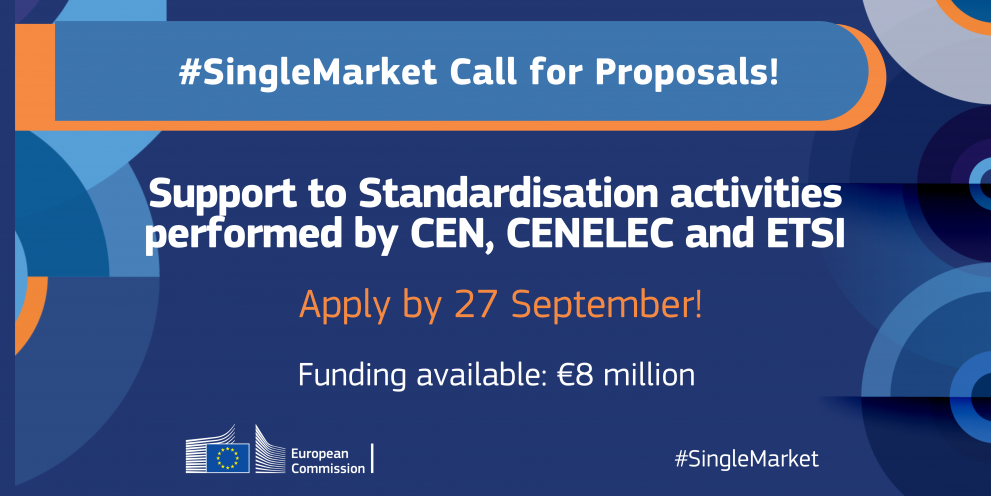
The primary objective of standardisation is the definition of voluntary technical or quality specifications with which current or future products, production processes or services may comply.
The Regulation (EU) No 1025/2012 governs European standardisation. CEN, CENELEC and ETSI are the European standardisation organisations recognised by that Regulation (annex I). They produce European standards and European standardisation deliverables, which support the implementation of EU policies and legislation.
The long-term partnership between the Commission and the European standardisation organisation (CEN, CENLEC and ETSI) builds on the shared objectives established by the EU policies and legislation.
The European standards, adopted after a request made by the Commission for the application of Union harmonisation legislation, are harmonised standards.
Compliance of a product, process or service with the harmonised standards offers presumption of conformity with the respected legislative provisions' essential requirements and allows commercialisation and implementation in all EU Member States.
European standards and European standardisation deliverables are essential for the implementation of the Single Market.
CEN, CENELEC and ETSI are the three identified beneficiaries eligible for funding under this call, invited to apply on the topics of their competence out of 22 topics of the call.
The call/invitation to submit a proposal, launched on 30 June 2022, is the second call this year to be managed in eGrants, following the successful on-boarding to eGrants of the programme.
The direct award to the CEN, CENELEC and ETSI of action grants will support their activities under the following topics:
- Topic 1 - 2022-STA Standards for the certification of chips in terms of security, authenticity, reliability;
- Topic 2 - 2022-STA Standards for low-carbon cement;
- Topic 3 - 2022-STA Standards for COVID-19 vaccines and medicines production;
- Topic 4 - 2022-STA Standards for hydrogen technologies and components for the transport and storage of hydrogen;
- Topic 5 - 2022-STA Standards for Smart Contracts (SC);
- Topic 6 - 2022-STA Assistance to standardisation work in mainstreaming climate adaptation into EU standards;
- Topic 7 - 2022-STA Rules of the Road in Space;
- Topic 8 - 2022-STA Standards for postal services and the improvement of quality of service in support of Directive 97/67/EC;
- Topic 9 - 2022-STA Standards for On Board Weighing (OBW) equipment;
- Topic 10 - 2022-STA Technical Specifications for Future Railway Mobile Communications System (FRMCS);
- Topic 11 - 2022-STA Standards for pyrotechnic articles (Directive 2013/29/EU);
- Topic 12 - 2022-STA Standards for Artificial Intelligence (AI);
- Topic 13 - 2022-STA Standards to support the European Accessibility Act and related accessibility legislation therein;
- Topic 14 - 2022-STA European standardisation deliverables on the safety of children's products;
- Topic 15 - 2022-STA Revision of existing standard EN 12566: Small wastewater treatment systems for up to 50 PT;
- Topic 16 - 2022-STA Standards for testing methods of final materials in contact with drinking water;
- Topic 17 - 2022-STA Standards for analytical methods monitoring PFAS in drinking water;
- Topic 18 - 2022-STA Standards for operating raw data and statistics exchange and a unified glossary;
- Topic 19 - 2022-STA Standards supporting Electronic Fee Collection;
- Topic 20 - 2022-STA Standards supporting Coexistence solution for Urban Rail and Road Intelligent Transport Systems;
- Topic 21 - 2022-STA European standardisation deliverables on the safety of feminine hygiene products;
- Topic 22 - 2022-STA Standards for predictive maintenance of machinery.
Since 1 April 2021, the Support to Standardisation strand of the Single Market Programme is managed by the European Innovation Council and SMEs Executive Agency (EISMEA).
Details
- Publication date
- 30 June 2022
- Author
- European Innovation Council and SMEs Executive Agency
